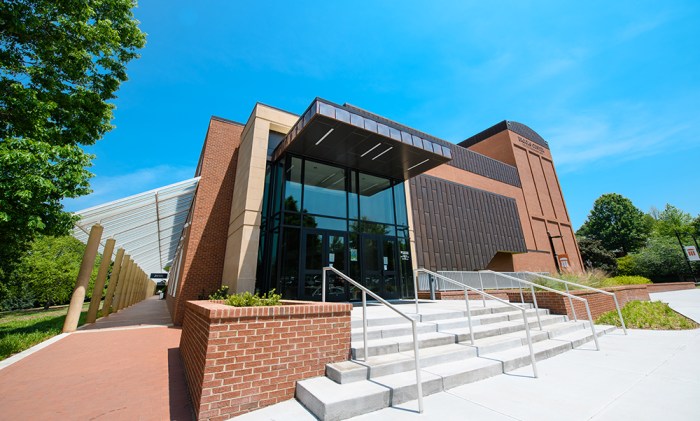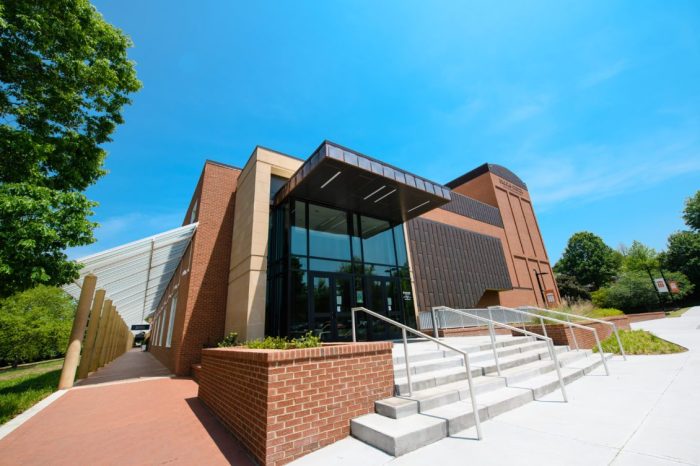The Brooks Center for Maritime Engagement stands as a beacon of maritime knowledge and innovation, fostering a dynamic environment for education, research, and collaboration that drives progress in the field of maritime studies.
Established in Virginia Beach, a strategic location for maritime activities, the Brooks Center has become a hub for scholars, policymakers, and industry professionals to engage in cutting-edge research, develop innovative educational programs, and forge partnerships that shape the future of maritime affairs.
Brooks Center for Maritime Engagement

The Brooks Center for Maritime Engagement, established in 2016, is a joint venture between Old Dominion University and the U.S. Navy’s Fleet Forces Command. Located in Virginia Beach, Virginia, the center serves as a hub for maritime research, education, and engagement.
Mission and Goals
The Brooks Center’s mission is to advance maritime knowledge and capabilities through collaboration, innovation, and education. Its goals include:
- Conducting maritime research and analysis
- Developing educational programs and training
- Fostering partnerships between academia, industry, and government
Significance of Location
Virginia Beach’s strategic location on the Atlantic coast makes it an ideal base for the Brooks Center. The city is home to a large naval presence, including the Naval Air Station Oceana and the Joint Expeditionary Base Little Creek-Fort Story.
This proximity to the Navy provides the center with access to resources and expertise for its research and educational programs.
Education and Research Programs: Brooks Center For Maritime Engagement

The Brooks Center for Maritime Engagement offers a comprehensive range of educational and research programs that contribute to the advancement of maritime studies. These programs are designed to provide students and researchers with the knowledge, skills, and insights necessary to address the complex challenges and opportunities facing the maritime industry.
Educational Programs, Brooks center for maritime engagement
The center’s educational programs include:
- Master of Science in Maritime Studies:This program provides students with a broad understanding of maritime affairs, including maritime law, economics, policy, and technology.
- Graduate Certificate in Maritime Studies:This certificate program offers a specialized focus on a specific area of maritime studies, such as maritime law or maritime security.
- Executive Education Programs:These programs are designed for professionals working in the maritime industry who seek to enhance their knowledge and skills in specific areas, such as maritime risk management or maritime finance.
Research Initiatives
The center’s research initiatives focus on a wide range of maritime issues, including:
- Maritime Law and Policy:The center conducts research on a variety of maritime law and policy issues, including maritime piracy, maritime boundary disputes, and the regulation of marine pollution.
- Maritime Economics:The center’s research on maritime economics focuses on the economic impact of maritime activities, such as shipping, fishing, and tourism.
- Maritime Security:The center conducts research on maritime security issues, such as piracy, terrorism, and the proliferation of weapons of mass destruction.
Contributions to Maritime Studies
The Brooks Center for Maritime Engagement’s educational and research programs make significant contributions to the field of maritime studies. The center’s programs provide students and researchers with the knowledge and skills necessary to address the complex challenges and opportunities facing the maritime industry.
The center’s research initiatives contribute to the advancement of maritime knowledge and help to inform policy decisions on a range of maritime issues.
Partnerships and Collaborations

The Brooks Center for Maritime Engagement fosters partnerships and collaborations with various organizations to enhance its impact and achieve its mission. These collaborations provide access to resources, expertise, and networks that complement the center’s capabilities.
Key Partners and Collaborators
The Brooks Center has established strategic partnerships with:
- Government Agencies:US Coast Guard, National Oceanic and Atmospheric Administration (NOAA), and the Maritime Administration (MARAD).
- Academic Institutions:University of Washington, Texas A&M University, and the Massachusetts Institute of Technology (MIT).
- Nonprofit Organizations:The Nature Conservancy, Oceana, and the World Wildlife Fund (WWF).
- Industry Partners:Boeing, Lockheed Martin, and Raytheon Technologies.
Benefits of Partnerships
These partnerships offer numerous benefits to the Brooks Center, including:
- Expanded Resources:Access to specialized knowledge, equipment, and funding opportunities.
- Enhanced Research Capabilities:Collaborative research projects with leading experts and institutions.
- Increased Outreach:Partnerships with nonprofit organizations and industry leaders extend the center’s reach and impact.
- Practical Applications:Industry partnerships provide insights into real-world challenges and facilitate the translation of research findings into practical solutions.
Impact of Collaborations
The center’s collaborations contribute significantly to its impact by:
- Advancing Maritime Knowledge:Joint research projects generate new insights and contribute to the body of knowledge in maritime affairs.
- Promoting Innovation:Partnerships with industry leaders foster the development of innovative technologies and solutions.
- Enhancing Policy Development:Collaborations with government agencies inform policy decisions and regulations related to maritime safety, environmental protection, and economic development.
- Educating Future Leaders:Partnerships with academic institutions provide opportunities for students to engage in cutting-edge research and gain hands-on experience in the maritime field.
Events and Outreach

The Brooks Center for Maritime Engagement actively engages with the community through a variety of events and outreach activities. These initiatives foster dialogue, promote knowledge sharing, and strengthen relationships with stakeholders.
The center hosts an array of events, including conferences, workshops, and public lectures. These events bring together experts from academia, industry, and government to discuss current issues and emerging trends in maritime affairs. The center also organizes outreach programs that connect with the local community, such as school visits, community presentations, and hands-on demonstrations.
Conferences and Workshops
- The center’s annual conference is a major event that attracts participants from around the world. The conference features keynote speeches, panel discussions, and research presentations on a wide range of maritime topics.
- The center also hosts specialized workshops that focus on specific aspects of maritime affairs, such as maritime security, ocean governance, and maritime transportation.
Public Lectures
The center offers a series of public lectures throughout the year. These lectures are open to the public and feature leading experts discussing current issues in maritime affairs. The lectures provide an opportunity for the community to engage with scholars and practitioners in the field.
Outreach Programs
- The center’s outreach programs aim to connect with the local community and promote maritime awareness. These programs include school visits, where center staff present on maritime topics and engage students in hands-on activities.
- The center also organizes community presentations that provide information on maritime issues and the center’s activities. Additionally, the center collaborates with local organizations to offer hands-on demonstrations and workshops on maritime topics.
These events and outreach activities contribute to the Brooks Center for Maritime Engagement’s mission of fostering dialogue, promoting knowledge sharing, and strengthening relationships with stakeholders. By engaging with the community, the center raises awareness of maritime issues, promotes maritime education, and supports the development of a maritime-literate society.
Future Directions

The Brooks Center for Maritime Engagement is committed to expanding its impact in the field of maritime studies and continuing to be a leader in maritime education and research. The center plans to achieve this through a variety of initiatives, including expanding its educational offerings, conducting groundbreaking research, and forging new partnerships with maritime stakeholders.
One of the center’s key priorities is to expand its educational offerings. The center plans to develop new courses and programs that will provide students with the knowledge and skills they need to succeed in the maritime industry. The center also plans to increase its outreach efforts to attract a more diverse student body.
In addition to expanding its educational offerings, the center also plans to conduct groundbreaking research in the field of maritime studies. The center’s research will focus on a variety of topics, including maritime security, maritime environmental protection, and maritime economic development.
The center’s research will help to inform policy and decision-making in the maritime industry.
Finally, the center plans to forge new partnerships with maritime stakeholders. The center will work with government agencies, industry leaders, and non-profit organizations to promote maritime education and research. The center’s partnerships will help to ensure that its work is relevant to the needs of the maritime industry.
Potential Growth Areas
The Brooks Center for Maritime Engagement has a number of potential growth areas. One area of growth is in the development of new educational programs. The center could develop programs that focus on specific maritime sectors, such as maritime transportation, maritime logistics, and maritime security.
The center could also develop programs that are tailored to the needs of specific student populations, such as working professionals and international students.
Another area of growth is in the conduct of research. The center could expand its research focus to include new topics, such as maritime climate change, maritime cybersecurity, and maritime artificial intelligence. The center could also conduct research in collaboration with other institutions, such as universities, government agencies, and industry partners.
Finally, the center could grow by forging new partnerships with maritime stakeholders. The center could partner with organizations to develop joint educational programs, conduct research, and promote maritime awareness. The center’s partnerships could help to expand its reach and impact in the maritime industry.
Questions and Answers
What is the mission of the Brooks Center for Maritime Engagement?
The Brooks Center for Maritime Engagement is dedicated to advancing maritime knowledge, fostering collaboration, and promoting sustainable maritime practices through education, research, and outreach.
What educational programs are offered by the Brooks Center?
The Brooks Center offers a range of educational programs, including graduate degrees, certificate programs, and executive education courses, designed to equip students with the knowledge and skills necessary to excel in the maritime field.
How does the Brooks Center contribute to research in maritime studies?
The Brooks Center conducts groundbreaking research in various areas of maritime studies, including maritime security, maritime law, ocean governance, and marine environmental management, contributing to the advancement of knowledge and informing policy decisions.
What are the key partnerships of the Brooks Center?
The Brooks Center collaborates with a wide range of partners, including universities, government agencies, industry leaders, and non-profit organizations, to leverage expertise, resources, and perspectives for the advancement of maritime studies.
